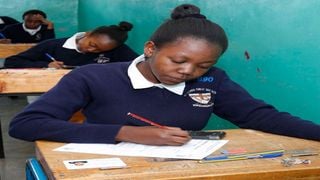
Form Four candidates at St Clare Girls Secondary School in Elburgon, Nakuru County, take Chemistry Paper One during the first day of the Kenya Certificate of Secondary Education examinations on December 2, 2022.
| John Njoroge | Nation Media GroupEducation
Premium
What KCSE subject grading review means for students
More than five million students will benefit from a new grading system in the Kenya Certificate of Secondary Education (KCSE) examinations that will leave out subjects they are not strong at and only consider their best grades in the final score.
The new system announced yesterday by Education Cabinet Secretary Ezekiel Machogu, reduces the number of compulsory subjects from five to two. Candidates’ mean grades will be calculated based on two compulsory subjects (mathematics and one language – English, Kiswahili or Kenya Sign Language) and five other best-performed subjects.
The previous system considered five compulsory subjects (English, Kiswahili, mathematics, two science subjects) and two humanities, which disadvantaged some learners whose best performing subjects were not considered if they did not fall within the stated formula.
“It is expected that the new reform measure will increase the number of students qualifying for universities, diploma and Technical and Vocational Education and Training (TVET), training at certificate and artisan levels,” Mr Machogu said.
He was speaking when he launched the 2023 examination season at the Kenya National Examinations Council (Knec) headquarters in Nairobi.
“The system we had before was affecting so many of our students. This was totally unfair and is something you don’t find in any other country. It was an unnecessary burden which we have to take away from our students,” the CS said.
According to a simulation by Knec based on the 2022 scores, if the grading structure was used then, there would have been 199,929 candidates scoring a mean grade of C+ and above (22.79 per cent) instead of the 173,345 who attained the grade representing a percentage of 19.62.
There are 903,260 candidates registered for this year’s KCSE.
The changes are part of recommendations of the report by the Presidential Working Party on Education Reforms (PWPER). The first group of students to benefit from the reforms is the 2023 class, which will sit their examinations from November 6 to November 24, with the results expected later in December.
Knec CEO David Njeng’ere told the Nation that the reforms aim at separating learners’ achievement from placement and is in tandem with global best practice. He said that the exit point of basic education should empower learners to transit to either higher education or the world of work.
Dr Njeng’ere said that the Kenya Universities and Colleges Central Placement Service (Kuccps) will decide on how to place the learners in higher education institutions based on their performance.
“We should focus more on the child. The grading system will allow them to follow the paths they are strong in. What does it benefit to tell a learner that they’re not good in a particular subject?” Dr Njeng’ere asked.
“When you compare with other countries, we’re lagging behind because of our grading, which had mixed up issues of achievement, certification and placement,” Dr Njeng’ere said.
In comparison, for equivalent examinations last year, Uganda had a pass rate of 61.36 per cent, Tanzania 36. 5 while Zambia had 69.31 per cent.
Mr Machogu said that preparations for administration of the examinations have taken into account the expected El Nino rains that are expected to start next month and possibly affect logistics.
“The government is keenly monitoring the weather reports to ensure necessary measures have been put in place to deal with any unfavourable conditions that could threaten the smooth delivery of the examination materials to some centres,” he said.
Teachers Service Commission CEO Nancy Macharia said the commission has vetted a total of 223,223 teachers who will serve as supervisors and invigilators while 37,731 others will be examiners. The deployment of the teachers was also reshuffled.
“No supervisor or invigilator is retained in the centre they served during last year’s national examinations to ensure annual rotation of staff,” Ms Macharia said.
The national examinations that will be administered this year will be the Kenya Primary School Education Assessment (KPSEA) for learners in Grade 6, the Kenya Certificate of Primary Education (KCPE) and the KCSE. KCPE has the highest registered number of candidates (1,415,315) followed by KPSEA (1,282,574).
The KCPE candidates will do their rehearsals on October 27 and sit the examinations from October 30 to November 1 2023. The KPSEA will be on the same dates.
In new changes, heads of institutions who act as examination centre managers during the examinations period will collect the morning examination papers and return the answer sheets to the distribution points and then collect the afternoon papers before returning the answer sheets later.
Each of the centres will have two armed security officers.
“We’ve agreed on double collection to address the challenge of early exposure. To mitigate the challenge of movement, we’ve mapped schools to the closest distribution point instead of the sub-county headquarters where the schools are in administratively. Some schools are too far away from the headquarters, but closer to some containers situated in a neighbouring county. We’ve also procured 82 more containers so we will have a total of 576,” Dr Njeng’ere told the Nation.
“The Ministry of ICT will be responsible for high-profile security that cannot be shared out in the public while Interior will deal with security issues. We use a double-locking system. The deputy county commissioners will be the custodians of the key to the container and the other one will be with the sub-county director of education,” he said.





